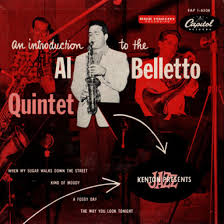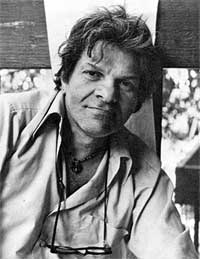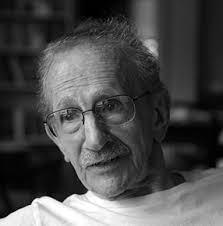
Daily Dose Of Jazz…
Werner Dies was born on January 15, 1928 in Frankfurt, Germany. An autodidact on guitar and saxophone, he studied clarinet and composition starting in 1947. From 1947 to 1955 he played guitar in the dance band of Willy Berking, and was a member of the bands Hotclub Combo and Two Beat Stompers.
He led his own ensemble, went on a tour of Yugoslavia in 1955 and from 1955 to 1965 he was a member of Hazy Osterwald’s sextet, and also worked as a session musician and arranger. He toured with Joe Turner and, in 1968, Charly Antolini.
He had a hit in Germany in 1954 with Schuster bleib bei deinen Leisten (The Little Shoemaker) that spent eight weeks at #1 on the German hit parade starting in October 1954. He later worked for Howard Carpendale, Adam & Eve, Graham Bonney, and other singers, and produced easy listening music with his own ensemble, the Werner Dies Sax Band.
He wrote a treatise on clarinet improvisation that was published in 1967. He produced the group Bläck Fööss from 1973 to 2003. Tenor saxophonist, clarinetist, guitarist, composer, and arranger Werner Dies died on February 5, 2003.
More Posts: arranger,bandleader,clarinet,composer,guitar,history,instrumental,jazz,music,saxophone

Daily Dose Of Jazz…
Johnny Varro was born January 11, 1930 in Brooklyn, New York and began studying piano at the age of ten. During his teenage years, he was introduced to jazz by way of the Commodore Music Shop in New York City. There he met the manager Jack Crystal, father of Billy Crystal, who was running jam sessions on the Lower East Side. At these sessions he met Willie “The Lion” Smith, Big Sid Catlett, Joe Thomas, Hot Lips Page, Joe Sullivan, Pete Brown and others. The experience of sitting in for Joe Sullivan and Willie “The Lion” Smith was invaluable and soon allowed Johnny to become a hired player.
His first professional job was with Bobby Hackett touring the East Coast with his quartet. In 1954 he worked at Nick’s with Phil Napoleon and later with Pee Wee Erwin. In 1957 Eddie Condon asked Johnny to play at his club as intermission pianist, which led to his becoming Eddie’s band pianist.
For the next several years between the Condon tours, Varro worked most of the jazz rooms around New York City before moving to Miami in 1965 to work on the Jackie Gleason Show. He toured with the Dukes of Dixieland, then moved to Los Angeles, California, where he lived, played and toured for the next 14 years. He created the swing group covering the styles of the ’30s, ’40s, and ’50s called Swing 7.
Pianist Johnny Varro, who has recorded some two dozen albums, made a final move to Tampa Bay, Florida in the early Nineties, where he continues to play jazz festivals, jazz parties and concerts around Europe and the United States.
More Posts: bandleader,history,instrumental,jazz,music,piano

Daily Dose Of Jazz…
Al Belletto was born on January 3, 1928 and raised in New Orleans, Louisiana. He graduated from Warren Easton Charter High School before entering Loyola University New Orleans studying music and then earning a master’s degree from Louisiana State University.
Belletto played with Sharkey Bonano, Louis Prima, Wingy Manone and the Dukes of Dixieland in the 1940s and 1950s. He went on to lead his own band and record several albums on Capitol Records from 1952. Along with his ensemble they became part of Woody Herman’s band for U. S. State Department tours of South America in 1958 and 1959.
In the Sixtiess, Al worked at the New Orleans Playboy Club fronting the house band and serving as Musical/Entertainment Director, booking nationally known acts into the venue.
Saxophonist and clarinetist Al Belletto, who recorded six albums as a leader, died on December 26, 2014 in Metairie, Louisiana.
More Posts: bandleader,clarinet,history,instrumental,jazz,music,saxophone

Jazz Poems
FOR MILES
Your sound is faultless
pure & round
holy
almost profound
Your sound is your sound
true & from within
a confession
soulful & lovely
Poet whose sound is played
lost or recorded
but heard
can you recall that 54 night at the Open Door
when you & bird
wailed five in the morning some wondrous
yet unimaginable score?
GREG CORSO
from Jazz Poems ~ Selected and Edited by Kevin Young
More Posts: book,classic,collectible,history,jazz,library,poet

Jazz Poems
SOLOING
My mother tells me she dreamed
of John Coltrane, a young Trane
playing his music with such joy
and contained energy and rage
she could not hold back her tears.
And sitting awake now, her hands
crossed in her lap, the tears start
in her blind eyes. The TV set
behind her is gray, expressionless.
It is late, the neighbors quiet,
even the city–Los Angeles–quiet.
I have driven for hours down 99,
>over the Grapevine into heaven
to be here. I place my left hand
on her shoulder, and she smiles.
What a world, a mother and son
finding solace in California
just where we told it would
be, among the palm trees and all-
night super markets pushing orange
back-lighted oranges at 2 A.M.
“He was alone,” she says, and does
not say, just as I am, “soloing.”
What a world, a great man half
her age comes to my mother
in sleep to give her the gift
of song, which–shaking the tears
away–she passes on to me, for now
I can hear the music of the world
in the silence and that word:
soloing. What a world–when I
arrived the great bowl of mountains
was hidden in a cloud of exhaust,
the sea spread out like a carpet
of oil, the roses I had bought
from Fresno browned on the seat
beside me, and I could have
turned back and lost the music.
PHILIP LEVINEfrom Jazz Poems ~ Selected and Edited by Kevin Young
More Posts: book,classic,collectible,history,jazz,library,poet



